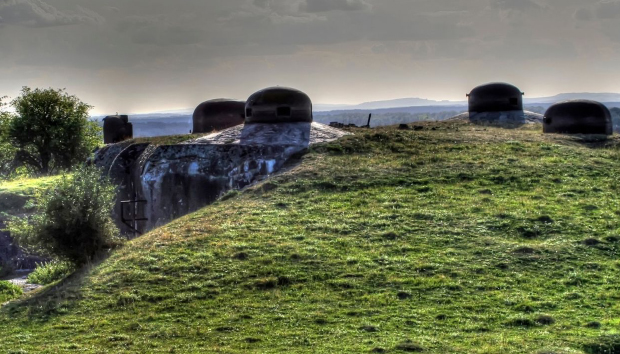The French military betrayal of May-June 1940

The French military betrayal of May-June 1940
After 60 years of secrecy, the archives of the Battle of France were finally opened to researchers in the year 2000.
They totally challenge the famous “Blitzkrieg” theory that: “The German victory was actually due to three main factors:
- Incomprehensible coincidences.
- Incomprehensible errors of the Allies.
- A no less incomprehensible individualism of a few “go-getter” generals at the head of the armored divisions and who confronted not only the Allies, but also the German leadership with a fait accompli. »
End of quote (K.H. Frieser 1940 French defeat, German victory under the eye of foreign historians page 86)
In other words, a story that no one understood but that, for lack of anything better, the public had only to accept as it was.
However, there have never been any coincidences or incomprehensible errors, even less a series of “miracles” according to another consecrated expression, having enabled the German columns to defeat four Allied armies in twenty days, but a very long series of betrayals.
Another observation: The omerta since imposed by the French state was also imposed by all those directly concerned. Indeed, how can we imagine that Germany, which was the main beneficiary, England, which was the main victim, but also Belgium, Holland, then all the occupied European countries, Russia, or the United States wouldn’t have understood the obvious?
Information now within everyone’s reach, since the works dealing with this betrayal and the “family conspiracy” (in the plural) that accompanied it are available for sale.
To make it easier for you, also watch our films on our YouTube channel.
We develop the main information there.
The betrayal in a few lines
French revisionist historians who have been able to work effectively on the archives of the Battle of France, since their official opening in the early 2000s, have been able to establish with certainty that:
- The German army was in no way superior to the Allied armies. The troops and materials at the disposal of the Allies on May 10, 1940 were superior in quantity and quality to the German army, including with regard to aviation.
- The Wehrmacht’s resources of ammunition, gasoline and armament only allowed it to fight for a maximum of one month. It was therefore absolutely necessary for Hitler to win a decisive victory within this time.
- The details of the German Plan, known as “Manstein”, providing for the main effort to be carried out in the Ardennes, on Sedan and Givet, were perfectly known to the French and Allied Intelligence Services, at the latest at the beginning of March 1940, i.e. more than two months before the attack.
- These same services also knew for certain the date of the attack, eight days before it took place.
- Based on this intelligence, General Gamelin, Commander-in-Chief of the Allied armies, devised a plan to lure General von Kleist’s Army Group A into the Ardennes trap.
- This trap planned to block the enemy advance in front of the Meuse by blowing up all the bridges and accumulating powerful reserves in the immediate vicinity, in order to support the three divisions in charge of holding the banks of the Meuse from Sedan to Givet.
- In a second movement, once von Kleist’s columns were entangled on four narrow roads in the heart of the massif in the greatest traffic jam in history, so without the possibility of quickly turning back, the generalissimo had planned a counter-attack in Belgium in the back of his adversary, at the height of the “Gembloux gap”, in order to cut him off from his supplies and from General von Bock’s army group B, still engaged in Holland.
- Finally, in a third phase, three reserve armies stationed on the Maginot line were to attack to the north via Luxembourg in order to join the 1st army at Gembloux to begin a counter-attack in Germany which would have made it possible to seize the regions industries in the Rhineland and the Saar, before moving on to Berlin.
- Knowing that the German army only had petrol and ammunition for one month, this plan, forcing it to fight on all fronts at the same time, would have quickly led it to capitulate, or to continue the fight by launching pebbles…
This excellent plan was sabotaged by the generals in charge of applying it
Contrary to the planned provisions and the clear orders given by General Gamelin:
- Static defenses that should have been deployed in the French Ardennes in areas slated for destruction were not deployed. The German columns crossing the Ardennes trap in a very perilous position were not bombarded for three days.
- The necessary modern armaments (tanks, planes, radio equipment, machine guns, etc.) were not delivered to the armies, but kept in depots, waiting to be handed over intact to the Germans.
On the front of the Second Huntziger Army
-
On May 13, from 5 a.m., when the Germans under the fire of French artillery could not cross the Meuse because they were unable to build the pontoon bridges essential for the passage of Panzers, tanks and French infantry elements that which can be designated under the term “special cagoulard sections” attacked from the back the artillery blockhouses and the various points of resistance on which the whole French device was articulated.
-
Around 3 p.m., the Bellevue blockhouse, the most important of the line, was destroyed by these French elements.
-
It was only from this moment that the first German infantrymen were able to cross the river on inflatable boats, without being mowed down by the fire from these blockhouses.
At the same time, while the Panzer Divisions and all their crossing equipment were clumping together in compact masses on the right bank of the Meuse, ideal targets for the artillery, the French General Huntziger ordered the withdrawal of these guns, this from his own initiative and without any strategic or tactical reason.
- At the same time, he ordered the reinforcements that had come to the aid of the defenders of the Meuse to turn around, while the latter were still holding the banks.
- The sabotage of the artillery and the gradual weakening of the troops remaining on the spot thus allowed the Germans to throw their bridges over the Meuse without suffering any losses, and the Panzers and heavy armaments were then able to cross without any opposition, the next morning May 14 at 7:20 a.m.
- The excuse officially invoked in front of the general public to justify this withdrawal was a “collective hallucination” which caused the “panic of Bulson”.
Shameless lie, demonstrated by the production of archives and testimonies.
- Finally the bombardments ordered for May 14, with the aim of destroying the German bridges were also sabotaged by the high command of the Air Force, in particular General Têtu, notorious Cagoulard, who stopped the waves of French attack . The British bombers, despite heavy losses, could not destroy a single one of these bridges.
On the front of the 9th Corap Army at Givet:
- While the Republican General Corap had dispatched reinforcements in the direction of Givet to organize the defense of the Meuse and a powerful counter-attack, this was sabotaged by General Martin who, also without any reason, withdrew the troops sent in reinforcement, leaving the 1st Heavy Tank Division unsupported at the same time. Without infantry, without supporting artillery, without petrol, the 1st DCR was totally annihilated, most of the tanks having had to be destroyed by their own crews.
- The other two armored divisions were deliberately scattered so as not to be able to effectively counter the Panzers arriving in compact masses.
- During these two crucial days: 13 and 14 May, the fighter squadrons were either grounded or dispatched to areas where there was no enemy aviation, giving up domination of the skies to the Luftwaffe above. above Sedan and Givet, in order to further facilitate the construction of bridges and the passage of Panzers.
These orders were given by the generals who were members of the conspiracy, again against those of the high command.
On the entire front, between May 15 and May 25:
- On the night of May 14 to 15, Generals Georges and Billotte, Commander-in-Chief on the North-East Front and the main responsible for the betrayal, ordered a general retreat of the Allied troops from the North Front in Belgium. This order was given when their position was extremely strong, facing Army Group B of the German army.
- This orderly movement, again against the orders of General Gamelin, knowingly sabotaged what can be called “Plan Gamelin N°2” which, after the failure of the “trap on the Meuse” , had planned to “pinch” the German Panzers at the exit of the Ardennes.
- Plan Gamelin N°3, which ordered a somewhat similar maneuver to be implemented from May 19, was sabotaged by the same generals who, again, did not carry out the orders.
- Between May 16 and May 19, certain officers, in particular commanding tank regiments, voluntarily abandoned, and without being attacked, the bridges to the Germans who presented themselves on the Somme on the Aisne and on the Oise. (Generals Duchemin and de Beauchesne)
- On the night of May 18 to 19, General Georges ordered, still in opposition to the formal orders of General Gamelin, to withdraw the French forces able to stop the Panzers on a Valenciennes – Laon line to withdraw them south of the Somme, thus opening wide the road to the sea for Guderian and Rommel. (Order No. 102)
Similarly, he sabotaged the planned tank counterattacks to the north and south. The French tanks were reduced to watching, guns at their feet, the Germans pass. - At the same time, many elite divisions remained without a fight in the Maginot Line and were kept there until their surrender.
- On May 20, after the dismissal of Generalissimo Gamelin, General Weygand, as the new commander of the allied armies, definitively interrupted Gamelin Plan N°3 and kept his troops without orders until May 25. It was only once the situation had been definitively compromised and the northern troops completely surrounded that he gave the necessary orders for a retreat towards Dunkirk.
- Behind the scenes, throughout the battle, Marshal Pétain informed Hitler through the Spanish ambassador of the military decisions taken and the evolution of his political maneuver to bring down the government of Paul Reynaud, then to overthrow the Republic and sign the armistice as soon as possible.
- When this goal was achieved, he stopped the fighting as soon as he had the power to do so.
Access to new testimonies makes it possible to establish that the state lie that followed the defeat was implemented in the following way:
The main witnesses, in their “Recollections” books, lied using writing stratagems ranging from the outright omission of essential data, to the crudest lies.
They are Generals Weygand and Georges. (speaking through the book of his chief of staff General Roton)
Among these high-ranking soldiers, other false witnesses such as Beaufre, Ruby, or Minart, as well as certain senior secret service officials used the same stratagems.
The goal was to propagate a completely false version of the Battle of France, so as to exonerate the real culprits and accuse the men who, on the contrary, had tried to counter it.
The main accused was to be Generalissimo Gamelin, while everything shows that the real culprit was General Georges.
The means employed by all these false witnesses, was to adopt without restriction, and especially without the slightest concrete element of proof, the version given by General Georges and the officers holding the Vichy regime, by trying to make believe that Gamelin did not had done nothing but count the flies in his HQ at Vincennes, totally uninterested in the battle.
This legend of the “aboulia” of the general-in-chief allowing to pass over in silence the orders he gave, and were not executed.
The French State, the main craftsman of disinformation
This state lie organized by Vichy was, in full knowledge of the facts, propagated after the Liberation by the most eminent French historians, and endorsed by the republican governments of the Fourth and Fifth Republics allowing the official version to prosper, since a number indefinite archive always remains beyond the reach of historians and that the most important of them, namely the Journal de Marche du Cabinet Gamelin – that is to say the precise day-to-day account of all events of the battle kept by the generalissimo’s staff – as well as his notebooks and personal diaries were stolen from his home before their filing in the archives by officers mandated by the Ministry of Defense only a few minutes after his death in the Val de Grâce hospital, April 18, 1958. This while Madame Gamelin was absent, and did not even know that her husband had just died (none of these documents reappeared at the time of the opening). official opening of the archives in 2000).
That is to say a few thousand absolutely essential pages as to the preparation and the unfolding of the battle, on which Generals Gamelin and Doumenc relied when writing their “testimonies for History” in order to accredit their statements, when they denounced the betrayals they suffered during the battle, as well as their actions to counter them, and the plans implemented.
To know everything about the intervention of the Ministry of Defense in 1956
If we add to this recognized theft, the “unfortunate” destruction and the disappearance, “incomprehensible” of course, of tons of archives after the war while they were under the responsibility of the Service historique des Armées, we understand better under which authority the “official” historians have totally discarded for nearly eighty years, the three books of Souvenirs written by General Gamelin, the Souvenirs de captivité of President Daladier, as well as a large number of official archives and reports.
Ditto for the two major works of General Doumenc: History of the 9th Army, and Dunkirk and the Battle of France, but also his Secret Papers, analyzed and published by the historian François Delpla in 1991.
Indeed, all these works, perfectly known to everyone and totally contradicting the “miraculous” thesis, were systematically either ignored or cited by these historians most often to divert them from their true meaning, namely a formal denunciation of the betrayals committed. work.
We will note here that it is undoubtedly unprecedented in history that the highest authorities, both military and academic, take the liberty of disregarding the testimony of the generalissimo in charge of leading a battle and of the main soldiers concerned.
The same lack of consideration for those of many Allied generals and political leaders, such as General van Overstraeten, military adviser to the King of Belgium or Minister Van Zuylen. And even that of General Winterbotham, head of the British Intelligence Services, concerning Enigma.
Ditto for the work of Anglo-Saxon historians denouncing the real war aims of certain American and British interest groups.
Throughout the world hundreds of works by Historians remain deliberately ignored
I am thinking in particular of those who, in the 1960s, looked into the real role of the German Democratic generals who, since Hitler’s accession to power, informed the Allied Intelligence Services of the smallest, most secret decisions taken by the Führer. .
So to the works of Mrs. Pierre Accoce and Pierre Quet concerning the Roessler network, entitled: The war was won in Switzerland and published by Perrin in 1965; as well as: It was called A 54 written by Mrs C. Amort and I.M. Jedlicka, published by Robert Laffont in 1966, which both describe precisely the way in which the Allies were informed of all the details of the Manstein Plan at the same time from March 10, 1940. And as for the date of the attack: from April 31!
This information, qualified by the Allied SRs as coming from extremely reliable sources, was concealed in all the so-called “historical” works to make way for the official thesis of the “blindness” of the Allied leaders, and other preposterous theories based on surprise effect”.
I am also thinking of all the testimonies from the period and works by historians concerning the state of the finances of the Reich and the pitiful reality of the German army.
And it will be understood that starting from these totally false bases, it was not very difficult to impose an “incomprehensible” thesis on the Peoples dumbfounded by so much incapacity on the Allied side, and so many brilliant initiatives on the German side!
Finally, knowing that these multiple betrayals, just like the real context and the issues mentioned above, are still actively hidden by ALL the States concerned, here is the ultimate proof of a will imposed on the Peoples beyond the borders to preserve the secret about this “strange defeat”.
Read more











